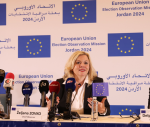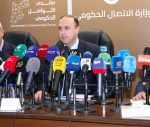You are here
The Ukraine war and European identity
May 16,2023 - Last updated at May 16,2023
BERLIN — The European Parliament elections are still a year away, but political parties across the European Union have already shifted to campaign mode. While the election will undoubtedly feature a wide range of views on climate change, immigration and religion, there is one issue that seems to unite politicians of all stripes: The war in Ukraine.
More than a year after Russian President Vladimir Putin invaded Ukraine, all mainstream European parties are still singing from the same hymn sheet when it comes to supporting the Ukrainian cause. But the appearance of unity masks a brewing conflict over the soul of Europe: Its conception of freedom. While it is widely acknowledged that Ukraine’s fight represents a fight for democracy and European values, it is also increasingly clear that victory would require Europe to abandon some of the key elements of its own freedom project. This is the paradox of freedom in Europe.
Over the past half-century, European countries have developed a concept of freedom that relies on universalism, the repudiation of military force, economic interdependence, pooled sovereignty, and the idea of Europe as a singular entity founded on a set of common institutions. This vision is what distinguishes the EU from other regions and even from its member states. But the war in Ukraine has called into question the bloc’s basic tenets, and opened the way for skeptical national leaders to challenge them.
While Europeans previously viewed their project as post-national, they now acknowledge that the EU model is exceptional rather than universal. Over the past year, European policymakers have become increasingly fixated on fortifying the EU’s borders against other political projects to the East and the South.
Consequently, European integration, originally pursued to ensure peace on the continent, has been transformed, if not quite into a “war” project, then at least into an armed pacification-cum-security project. Europe’s institutions, which once relied on soft power, now provide military equipment to Ukraine and endorse the continent’s rearmament, and the European Commission has weaponised the EU economy through sanctions and accelerated the transition to a war economy, complete with rationing and energy-price controls.
But the most dramatic shift in European political thinking has been the reconsideration of interdependence. European integration was based on the belief that deepening economic ties between countries could transform former adversaries into allies. But, as Putin has demonstrated, interdependence can also be exploited as a tool for extortion.
For decades, the main goal of the European project was to tame nationalism by pooling sovereignty. But now, Europeans recognise that sovereignty must be protected before it can be pooled. The EU’s transnational legal system cannot serve as a universal blueprint for the entire continent, let alone the world.
In the early stages of the war, the tension between the EU’s liberal values and its wartime mobilisation was less pronounced. The technocratic European Commission supported the war effort by advocating measures to arm and morally bolster Ukraine in its struggle against Russian aggression. The decision to grant Ukraine candidate status represented an exceptional step for the bloc, a marriage between geopolitical imperatives and the tools of process-oriented bureaucracy.
Meanwhile, both the left and the right have had to adjust their positions to find common ground on Ukraine. European liberals have become less resistant to nationalism and more attuned to the necessity of using force against Russia, and the right has been forced to reassess its stance on the EU’s role as a strategic actor.
The 2008 global financial crisis and the 2015 refugee crisis catapulted the far-right to the forefront of the political debate. But the failure of Brexit, together with the COVID-19 pandemic, led to a decline in Euroskepticism, with mainstream parties benefiting from the public’s desire for stability. Polling by the European Council on Foreign Relations (ECFRs) has shown that during these crises, many right-leaning voters recognised that sovereignty could be reclaimed only through collective action, and many formerly Euroskeptic parties abandoned their pledges to leave the EU or abandon the euro.
Voters across the bloc have undergone a similar shift. ECFR’s latest opinion poll shows a blurring of the traditional left-right divide on geopolitical matters and a growing fusion of nationalism and cosmopolitanism under the European idea of freedom. This change, spurred by the war in Ukraine, goes to the heart of what the European project is really about, and in the long run will lead to a struggle over Europe’s identity. In that regard, the upcoming European elections could serve as a bellwether.
Although European parties are currently trying to outdo each other in showing support for Ukraine, thorny issues such as the conduct of the war, the treatment of refugees, and how a post-war Ukraine would be integrated into the EU could once again divide Europe. If fatigue from the war, the refugee crisis, and the high cost of living sets in, the 2024 European elections could become a new battleground.
Mark Leonard, director of the European Council on Foreign Relations, is the author of “The Age of Unpeace: How Connectivity Causes Conflict” (Bantam Press, 2021). Copyright: Project Syndicate, 2023.













